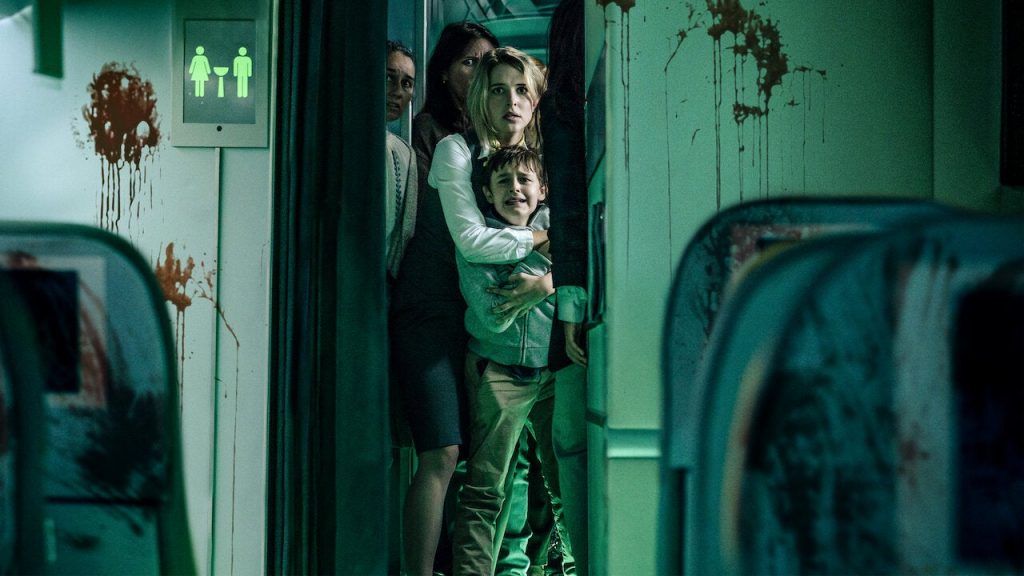Huesera 2022 Movie Review
“When you become a mother, you feel like you are split in two,” a character says late in Michelle Garza Cervera’s “Huesera.” The words are supposed to be comforting, a reminder that the physical and emotional toll the pregnancy is taking on young Valeria (Natalia Solien) is not just natural, but expected. “And just wait for when you’re in labor! You’ll literally feel like your bones are breaking!” By the time the audience hears those words, it’s clear this Mexican body horror film is mining such fears in very literal ways for what’s a haunting and probing story about the horrors of motherhood.
Pregnancy, as it turns out, has made Valeria lose her bearings. She does in fact feel split in two and images and sounds of broken bones haunt her wherever she goes. A moment that should’ve been the culmination of the life she’s made with her loving partner (Alfonso Dosal’s Raúl) has turned instead into a never-ending moment of anguish. She’s had to turn over her carpentry workshop so they can set up a nursery. She’s begun to lose weight after losing her appetite. She’s slowly, in ways both physical and psychological, losing herself.
most is the alienation she feels from her own life, from her own body. Indeed, the more she becomes untethered from her life, the more she begins to think back to the radical young woman she once was. She may live now in a gorgeous condo with a loving partner (whose mother is appalled Valeria has opted to build a crib rather than buy one), but that’s a life her younger self would never have pictured.
In flashbacks prompted by moments when Valeria wishes she could escape her present state — as in a bath where she plunges her face in the water as if she hoped to drown herself — Garza Cervera opens us up to the young punk anti-establishment girl she once was. The kind who’d chant, “No to domesticity!” while playfully flirting with her friend Octavia. Motherhood, we soon learn, feels less like a crowning achievement of the life Valeriano wanted for herself and more of an imposed stricture she’d rather avoid.
As she reconnects with Octavia (Mayra Batalla) and continues scaring herself with her nonexistent mothering instincts (at one point she worries she may have killed her own baby), the film tilts straight from a psychological thriller all the way into supernatural horror. Several exorcism scenes suggest there may be darker forces afoot that won’t be fought with might and prayer alone.
La Huesera is at times spine-chillingly terrifying. Rarely resorting to jump scares, the horrors in Garza Cervera’s project come from increasingly disturbing imagery (a sequence toward the end uses bone-breaking sound design to horrifying ends). Likewise, its visual grammar privileges an off-kilter sensibility that keys us into the sense that something is always slightly off. Cinematographer Nur Rubio Sherwll often shoots Valeria through slats and windows, privileging obstructed views that never allow us to see her clearly, never whole.
Not that Solien needs the entire frame to command one’s attention. The Mexican actress, here making her feature film debut, is resplendent in the film. Capturing Valeria’s slowly deteriorating psyche as well as her increasing paranoia — all in service of better coming to terms with who she wishes to be — Solien’s raw talents are on full display, carrying the film’s scariest and most heartbreaking moments in equal measure.
A fable of modern motherhood, of calcified feminist ideas about domesticity and women’s agency, “Huesera” offers a Mexican folk-inspired spin on such horror classics as “The Babadook,” “Hereditary,” “Rosemary’s Baby” and “Boias maneras.” Examining the bone-breaking work that being a mother can be, Garza Cervera’s tale is most thrilling for the ways it refuses any tidy answers about a woman’s place and wallows (and finds plenty of terror) in the ambiguities therein.




